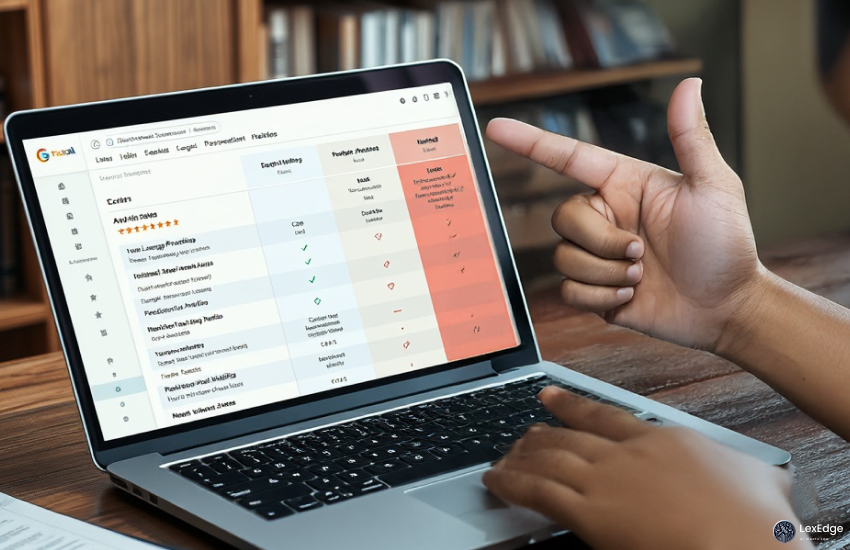Comparative Study of AI-Driven Legal Research Tools: Shaping the Future of Law

AI-driven legal research tools are transforming the legal landscape. Platforms such as LEGALFLY, Westlaw, and Lexis+ AI accelerate due diligence, streamline litigation preparation, and ensure regulatory compliance. While human oversight remains essential, AI reduces research time, improves accuracy, and enhances predictive analytics. Emerging trends include custom LLM integration, workflow integration, and advanced privacy features, making AI tools indispensable for modern law firms.
The Evolution From Bookshelves to Algorithms

Legal research has traditionally been a time-consuming process, relying on manual searches through extensive law libraries and databases. Today, AI-driven legal research tools are transforming the way legal professionals work, offering faster, more accurate results and making research more efficient. These AI legal platforms go beyond basic keyword searches, providing context-aware insights, predictive analytics, and automated workflows. By minimizing human error and accelerating complex legal analysis, these tools enable law firms to enhance productivity, ensure compliance, and gain a competitive edge in the modern legal landscape.
Core Ideas and Comparative Features

Top AI Legal Research Tools for Faster and Accurate Legal Work
| Tool | Key Feature | Security & Compliance | Notable Strength |
| LEGALFLY | Accelerated document review and multi-jurisdictional validation | SOC 2 Type II, ISO 27001, auto-anonymization | Strong focus on privacy |
| Westlaw | Extensive databases and AI-powered search | GDPR, ISO certifications | Reputable resource depth |
| Bloomberg Law | Advanced analytics and workflow tools | Robust data protection | Offers predictive analytics |
| Callidus Legal AI | Multi-step reasoning and citation validation | Not specified | High accuracy in legal insights |
| Lexis+ AI | Rapid data analysis and compliance reviews | Not specified | Speed and scalability |
| Casetext CoCounsel | Contextual search with intuitive interface | Not specified | Cost-effective solution |
AI legal research tools like LEGALFLY, Westlaw, and Lexis+ AI speed up research, improve accuracy, and maintain compliance for modern legal professionals.
Real-World Impact and Examples

- Accelerated Due Diligence: Tools like LEGALFLY enable faster contract analysis during M&A processes, saving time while ensuring data anonymization and regulatory compliance.
- Litigation Preparation: Platforms such as Westlaw and Lexis+ AI streamline legal precedent searches, helping legal professionals build arguments efficiently.
- Regulatory Compliance: Bloomberg Law monitors regulatory changes and sends real-time alerts, supporting in-house counsel in maintaining compliance.
While AI-driven legal research tools improve speed and accuracy, human oversight remains essential for complex legal interpretation and decision-making.
Challenges and Critical Perspectives

- Accuracy Issues: AI legal research tools may misinterpret complex legal queries, producing incorrect citations and requiring careful human review.
- Contextual Understanding: Deep legal analysis and nuanced interpretation still rely on experienced legal professionals.
- Data Privacy Concerns: Some platforms lack robust data anonymization features, putting client confidentiality at risk.
- Investment in Training: Law firms must invest in staff training to effectively leverage AI tools in research.
While AI enhances efficiency in legal research, human expertise is essential to ensure accuracy, compliance, and ethical use.
Emerging Trends and the Road Ahead

- Custom LLM Integration: Innovations like LEGALFLY use large language models (LLMs) for improved legal research accuracy.
- Enhanced Predictive Analytics: Platforms such as Bloomberg Law leverage predictive analytics to forecast legal outcomes and regulatory changes, supporting strategic decision-making.
- Workflow Integration: Many AI legal research tools now integrate seamlessly with document editing software like Microsoft Word, streamlining workflows.
- Privacy Enhancement: Growing focus on automatic data anonymization ensures compliance and protects client confidentiality.
The future of AI in legal research emphasizes accuracy, efficiency, and secure compliance, making it a crucial asset for law firms and legal professionals.
Conclusion
AI legal research tools are a game-changer for law firms, complementing human expertise to deliver faster, more accurate, and compliant results. By integrating these tools, training staff effectively, and keeping up with technological advancements, legal professionals can maintain a competitive edge and streamline complex workflows.

